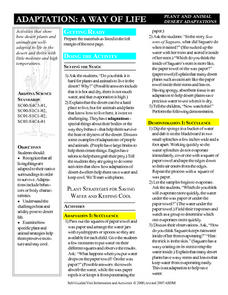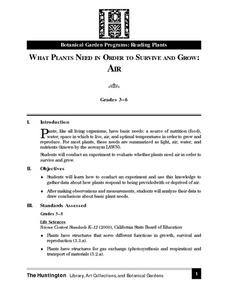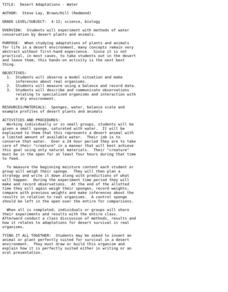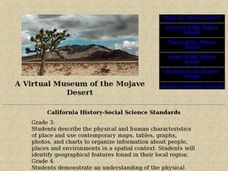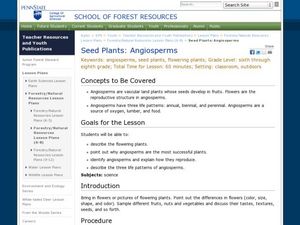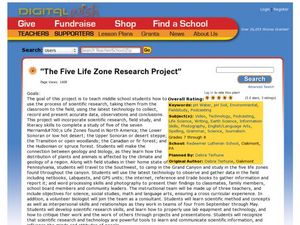US Mint
Desert Dwellers
What can a quarter possibly teach young learners about desert ecosystems? More than you might think. After displaying and discussing the included picture of the Arizona state quarter, the class participates in a series of shared reading...
Curated OER
Report on Desert Plant or Animal
Students are introduced to desert plants and animals. They demonstrate that the name of an organism does not always match the object. Students perform a guided internet search in order to complete a report.
Curated OER
Endangered Species in the Sonoran Desert
Students identify and explain some caused of endangerment and extinction for species as well as explain the effects of extinction on an ecosystem. Teachers use this lesson plan before teaching students about collecting insects or plants.
Curated OER
Plant Diversity and Distribution
Learners construct a defined plot on school grounds and observed patterns in plant life. They count trees, shrubs, cacti and record on a data sheet. They compare data and generate a plant diversity overlook for their school.
Curated OER
The Desert Alphabet Book
Learners explore world geography by researching a science book with their classmates. In this desert identification lesson, students utilize a U.S. map to locate the geographical locations of deserts. Learners create an oral report based...
Desert Discoveries
Sonoran Desert ABC's
Third graders make alphabet cards that depict the wide variety of life forms found in the Sonoran Desert. A terrific lesson that combines language arts, visual arts, and life science all into one wonderful package. Each of the cards has...
Curated OER
Desert Habitat
Students examine how desert plants and animals are adapted to life in the desert. They listen to the book, "Seasons of Saguaro," conduct experiments to demonstrate plant succulence, and create and draw an animal or plant that...
Desert Discoveries
Built for the Desert
The saguaro cactus has an amazing ability to survive in a harsh environment. Learners identify the many adaptations for desert life that the saguaro employs. They look at each part of the saguaro and determine what role it plays in the...
Curated OER
Desert Adaptations
In this desert adaptations worksheet, students are given a water filled sponge which represents an animal. Students observe their "animal" for a 24 hour period and conserve the water in the sponge as best they can. They measure and...
Curated OER
What Plants Need in Order to Survive and Grow: Air
Students conduct an experiment to determine whether plants need air in order to survive and grow. They discuss natural resources, analyze slides, and observe and record data from the experiment.
Curated OER
Desert Adaptations: Water
Learners experiment with methods of water conservation. For this water conservation lesson, students explore the importance of water for plants and animals in a desert biome.
Lerner Publishing
Teaching Habitats
What makes up a habitat? Use this resource to engage first graders in the exploration of desert, wetland, forest, and ocean habitats. Youngsters classify plants and animals into the four distinct habitats through drawings and cutting and...
Curated OER
Life in Sahara
Students explore the geography of the Sahara region of Africa and identify characteristics of a desert habitat. They explore the culture of the people living there and how it has adapted to desert life.
Curated OER
A Virtual Museum of the Mojave Desert
Learners study deserts and the plants, animals, and people who inhabit them. In groups, they create their own stories about the inhabitants of the Mojave desert.
Curated OER
The Desert Alphabet Book
Students use a book to discover an interesting fact from the desert using each letter of the alphabet. Using a United States map, they identify the meanings of symbols and locate deserts within the U.S. In groups, they participate in...
Curated OER
Opening Doors to Social Studies with Children's Literature: The Desert Alphabet Book
Pupils explore the geography of the United States. In this social studies lesson, students identify the major deserts on a map of the United States.
Curated OER
Seed Plants: Angiosperms
Middle schoolers describe flowering plants and see why angiosperms are the most successful plants. In this angiosperms instructional activity students identify angiosperms and explain how they reproduce.
Curated OER
Taking Count of Biodiversity
Here is a well-designed lesson plan on biodiversity that should intrigue your charges. In it, pupils compare a natural desert area to a school field to see how habitat destruction affects species diversity. Groups set up transects and...
Curated OER
Plants and Ecosystems
The relationships within and between ecosystems can be explored. after examining an area for living and non-living things students complete the same examination in the forest ecosystem. Students identify abiotic and biotic elements in an...
Curated OER
Day and Night in the Desert
Learners illustrate scenes showing day and nighttime activities in the desert. They include plant and animal life including predators and prey.
Curated OER
Patterns and Adaptations in Plants and Animals
Fourth graders conduct research about some of the regions of Texas. They compare plants and animals to identify different adaptations. The statistics of survival rates are measured for changes.
Curated OER
Unique Plants of the Biomes
Students examine how the earth is divided into different biomes that are characterized by a distinctive climate. In this earth's surface lesson plan students identify adaptations of plants in specific biomes.
Aquarium of the Pacific
Ecosystem Comparison
Fifth graders examine plants and animals in two ecosystems and compare them. In this ecosystem survival lesson, 5th graders compare and contrast a coral reef and kelp forest ecosystem. Students investigate the abiotic and biotic factors...
Curated OER
The Five Life Zone Research Project
Students study five of the seven life zones in North America. In this journalism lesson students use the Scientific Method working in teams. They use lab equipment and technology to create a presentation on five of the seven life zones...








